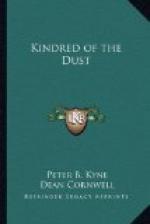“Of course Nan did not return to San Francisco, but evidently her husband did and at their apartment he found this letter addressed to Nan. He opened it, and immediately set out for San Jose to call upon the pawnbroker and gain possession of the marriage license. Unknown to him, however, his lines were all tangled and the pawnbroker told him frankly he was a fraud and declined to give him the license. Finally the pawnbroker tried a bluff and declared that if the man did not get out of his place of business he would have him arrested as a bigamist—and the fellow fled.
“A month or two later the pawnbroker was in San Francisco so he called at the Altamont Apartments to deliver the license in person, only to discover that the person he sought had departed and that her address was unknown. So he wrote Nan again, using her married name and addressed her at Port Agnew, Washington. You will remember, of course, that at this time Nan’s marriage was not known to Port Agnew, she had kept it secret. Naturally the postmaster here did not know anybody by that name, and in due course, when the letter remained unclaimed he did not bother to advertise it but returned it to the sender.”
“It doesn’t seem possible,” Mrs. McKaye declared, quite pop-eyed with excitement.
“It was possible enough,” her son continued drily. “Well, the bewildered pawnbroker thrust the license away in his desk, and awaited the next move of the man in the case. But he never moved, and after a while the pawnbroker forgot he had the license. And the minister was dead. One day, in cleaning out his desk he came across the accumulated papers in the case and it occurred to him to write the state board of health and explain the situation. Promptly he received a letter from the board informing him that inquiries had been made at the board of health office for a certified copy of the license, by Miss Nan Brent, of Port Agnew, Washington, and that the board had been unable to furnish such a certified copy. Immediately our obliging and intelligent pawnbroker, whose name, by the way, is Abraham Goldman, bundled up the marriage license, together with the carbon copy of the pawn ticket he had given the thief; a press clipping from the San Jose Mercury recounting the story of the capture of the thief; carbon copies of all his correspondence in the case, the original of all letters received, the photograph of the check—everything, in fact, to prove a most conclusive case through the medium of a well-ordered and amazing chain of optical and circumstantial evidence. This evidence he sent to Miss Brent, Port Agnew, Washington, and she received it about a week before I married her. Consequently, she was in position to prove to the most captious critic that she was a woman of undoubted virtue, the innocent victim of a scoundrel who had inveigled her into a bigamous marriage. Of course, in view of the fact that the man she went through a legal marriage ceremony with already had a wife living, Nan’s marriage to him was illegal—how do you express it? Ipso facto or per se? In the eyes of the law she had never been married; the man in the case was legally debarred from contracting another marriage. The worst that could possibly be said of Nan was that she played in mighty hard luck.”




